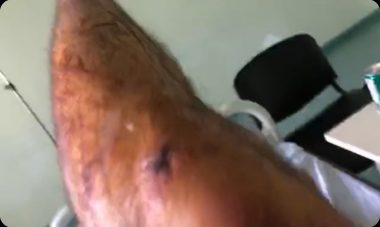Handling Life’s Fragility With Care
Written by |

In late July, before my nephew, Dylan, moved to the Georgian capital of Tbilisi, in the Caucasus region, for several months, I played several songs for him while we were in his car.
One of them was a live version of “Fragile” by Sting. I know Dylan’s taste in music and knew he would like it. He liked it so much that he played the studio version on Spotify.
The lyrics are especially poetic: “On and on the rain will fall/ Like tears from a star, like tears from a star/ On and on the rain will say/ How fragile we are, how fragile we are.”
Dylan knows how fragile life can be. Two years ago, he and his mom, my sister, were in a car parked in his family’s driveway when a tree from a neighbor’s yard fell on the vehicle, crushing her and causing her death. He was uninjured.
But Dylan wasn’t as lucky during a recent accident — another reminder of how fragile life can be.
People in the Huntington’s disease community know about life’s fragility. Because the people I love most, my wife and daughter, are both gene-positive for HD, we deeply understand it, too, as there currently is no cure for the disease.
In coming to grips with this knowledge — no cure means no way to stop HD’s ferocious onslaught — I’ve accepted that they will suffer. They’ve accepted that fact as well.
“On and on, the rain will say/ How fragile we are …”
I used to fear life’s fragility. I wanted no part of suffering. I never wanted my eldest sister to suffer from breast cancer and then liver cancer, which she eventually died from. I never wanted my other sister to suffer from a severed spinal cord and traumatic brain injuries after a tree fell on her.
I never wanted Dylan to fall off a trail while running away from three Georgian shepherd dogs who were advancing toward him and a friend in the Tusheti National Park in the mountains of northeastern Georgia, where they were hiking in mid-August. The dogs were being territorial, and thus, were in attack mode.
The trail ran above and parallel to a ravine, so when Dylan fell, he literally fell off the edge, cartwheeling and tumbling his way down the ravine through loose dirt and rocks. He fell about 100 feet, breaking his right arm and severely spraining his right ankle along the way.

A screenshot from a video call with my nephew shows several gashes on his leg after a fall in northeastern Georgia, in the Caucasus region. (Photo by Carlos Briceño)
He has a concussion, several deep gashes on his body, and multiple cuts on his face. It is a miracle he didn’t break his spine. He owes that to a gym bag, which was tightly secured to his back and filled with books and electronics (a GPS, cellphone, and a power bank charger). It sustained the brunt of the impact, though all the contents were smashed.
“On and on, the rain will say/ How fragile we are …”
I am grateful Dylan is alive and not paralyzed. He is grateful as well, and told me on the phone that the song “Fragile” now represents “a truth that is hard to bear witness to.”
I want to bear witness to this: In accepting that suffering is an inescapable truth for everyone, I’ve learned that rather than fearing fragility, I am stronger and mentally healthier by embracing it as a way to make every second count.
Instead of seeing suffering as a negative, I now understand that it builds character and allows for countless opportunities to embrace love, kindness, joy, patience, and mercy.
Now that I no longer fear suffering, I understand on an even deeper level the saying, which is especially appropriate for those in the HD community, “Life is fragile. Handle with care.”
***
Note: Huntington’s Disease News is strictly a news and information website about the disease. It does not provide medical advice, diagnosis, or treatment. This content is not intended to be a substitute for professional medical advice, diagnosis, or treatment. Always seek the advice of your physician or other qualified health provider with any questions you may have regarding a medical condition. Never disregard professional medical advice or delay in seeking it because of something you have read on this website. The opinions expressed in this column are not those of Huntington’s Disease News or its parent company, Bionews, and are intended to spark discussion about issues pertaining to Huntington’s disease.







Betty Jean Crump
My husband has Huntinton's Disease. I would be very appreciative to learn about the trials being offered.for rare diseases... Any information would be greatly appreciated. Sincerely, Betty Jean